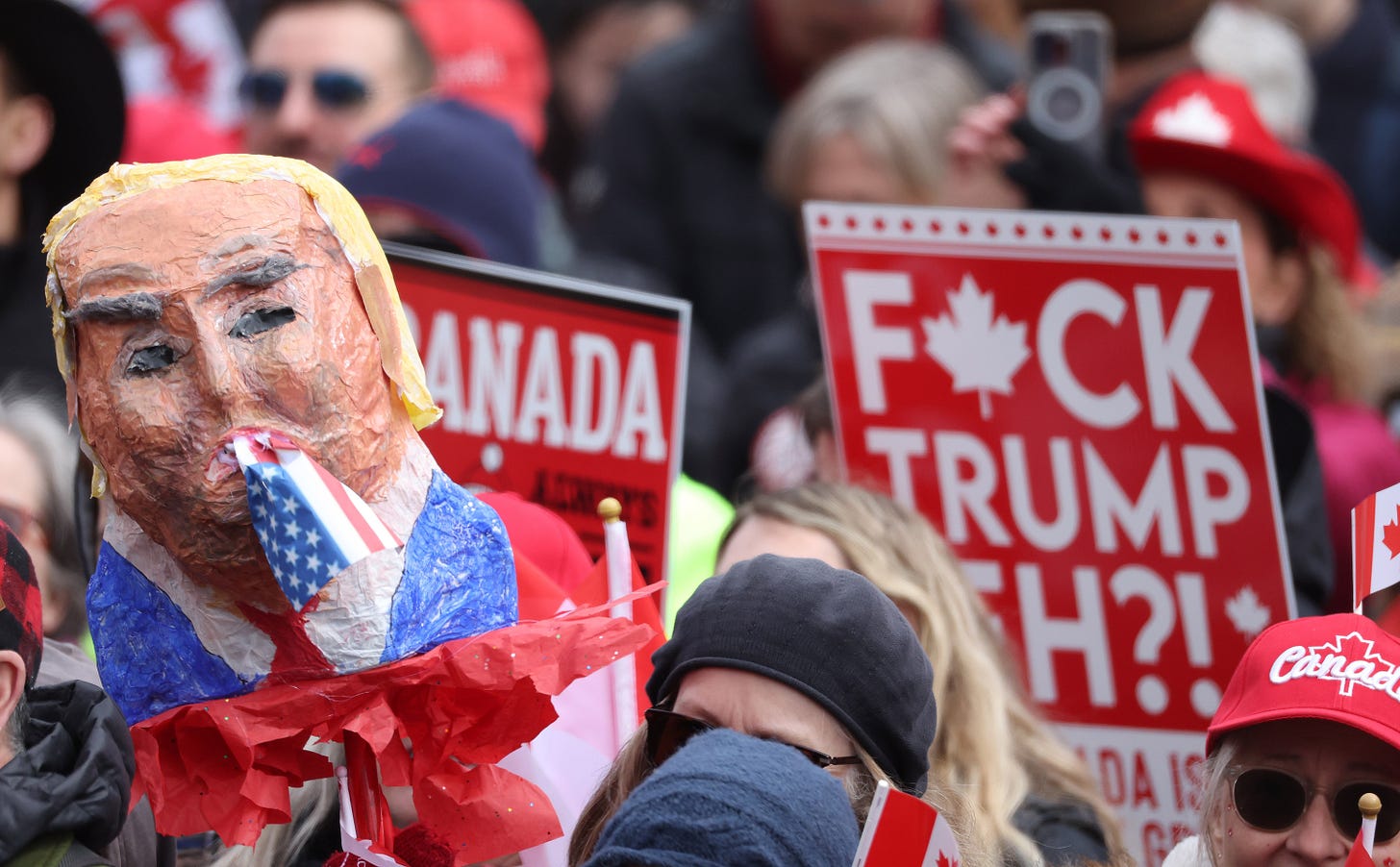"Elbows up," explained by a Canadian
"Take off the gloves and get ready for a fight. It’s a defensive posture. You protect your territory."
🇨🇦 🇨🇦 🇨🇦 With corporate outlets obeying in advance, supporting independent political media is more important right now than ever. Public Notice is possible thanks to paid subscribers. If you aren’t one already, please click the button below and become one to support our work. 🇨🇦 🇨🇦 🇨🇦
Donald Trump didn’t run on annexing Canada, but he’s certainly spent a lot of political capital recently demeaning and alienating our northern neighbors.
"Canada doesn't pay for military. They give us nothing. And they are the worst people to negotiate with of everybody ... they cheat,” Trump said last month.
“It's meant to be our 51st state. One of the nastiest countries to deal with is Canada,” he added during the same interview.
Americans may largely roll their eyes when they hear Trump talk like this, but it’s serious stuff for Canadians. Trump’s rhetoric has led to a sudden resurgence in Canadian nationalism and even has leaders like new Prime Minister Mark Carney talking about America like it’s a hostile foreign adversary.
“I reject any attempt to weaken Canada, to wear us down, to break us so that America can own us. That will never happen,” Carney said in a recent speech. “And our response to these latest tariffs is to fight.”
How is Trump turning Canada against America, and can the relationship ever return to normal? To get answers to those questions, we connected with Colin Robertson, a former Canadian diplomat who spent most of his career working on Canada-US relations, held posts all over America, and worked on major trade deals between Canada and the US, including NAFTA and the US–Mexico–Canada Agreement (USMCA).
“There’s now a sense that this kind of big brother who was benevolent and benign and often protective is now a predator, an abuser. That’s shaken Canadians,” Robertson told us.
“I know people who voted for Trump, in Florida, and they keep saying, ‘This isn’t really aimed at you. We’re sorry. We didn’t know this was going to happen.’ I’ll say, ‘It’s not about you. It’s your president, but I encourage you to speak out, because that’s the only way things will change.’”
The full conversation between Robertson and Public Notice contributor Thor Benson, lightly edited for length and clarity, follows.
Thor Benson
I’d have to imagine lots of your fellow Canadians are quite upset at the United States right now.
Colin Robertson
I’ve never seen anything quite like it. Gallup does a poll every year asking Americans and Canadians how they feel about each other, and usually upwards of 90 percent of Americans support Canada, with the rest being upset that we beat them at hockey. In Canada, it’s usually around 65 percent support for America. My guess right now is that it would be in the 20s or worse, all because of Donald Trump’s threats to annex us.
He refers to us as the 51st state. Canadians are not usually a flag waving country, but on our flag day this year, the living prime ministers from both big parties said, “Fly your flag.” People don’t usually do it, but we went up and down streets in our neighborhood and every third house had a flag in the window. It transcended politics.
This was very much in reaction to Trump. The whole country has been struck by it, and Trump’s threats are now probably the top issue in our election campaigns. Normally, elections are about the economy, healthcare, and social services. But this time the transcendent issue is Trump’s threats to Canadian sovereignty.
Thor Benson
And the Liberal Party, which Justin Trudeau previously led, wasn’t doing that well in the polls before Trump started all this, right?
Colin Robertson
For the last almost three years, it looked like the opposition Conservative Party, where leader Pierre Poilievre has adopted some of Trump’s populist rhetoric, was going to win easily — they were 20 points ahead in the polls.
After 10 years in government, there was a strong feeling across the country that we needed a change. Justin Trudeau stepped down largely because of a revolt in his own party. They said, “If you’re the leader in the next election, we’re going to get wiped out.” And then Trump won.







